Women skiers, this is the place for you -- an online community without the male-orientation you'll find in conventional ski magazines and internet ski forums. At TheSkiDiva.com, you can connect with other women to talk about skiing in a way that
you can relate to, about things that
you find of interest. Be sure to join our community to participate
(women only, please!). Registration is fast and simple. Just be sure to add
[email protected] to your address book so your registration activation emails won't be routed as spam. And please give careful consideration to your user name -- it will not be changed once your registration is confirmed.

